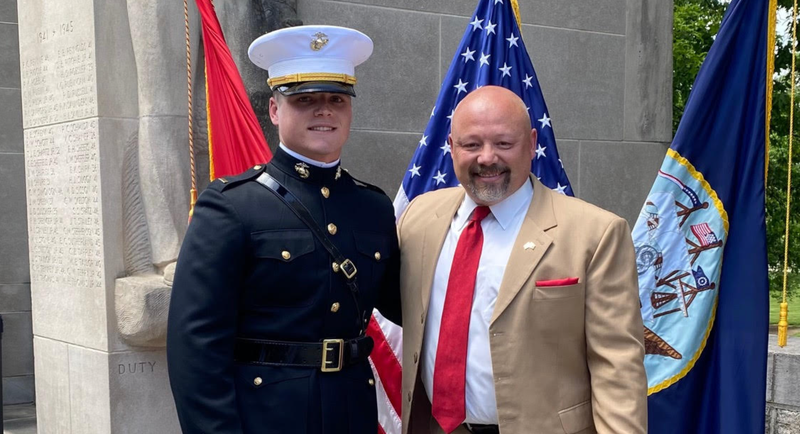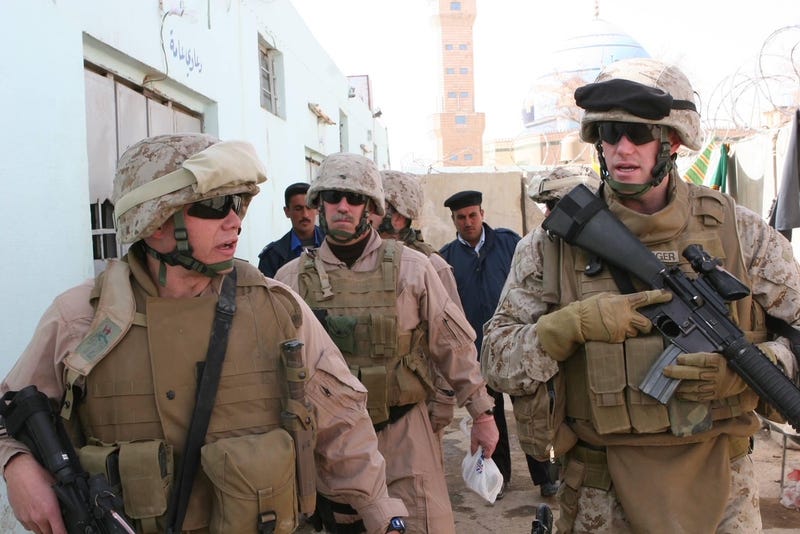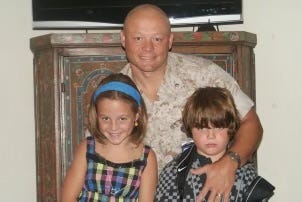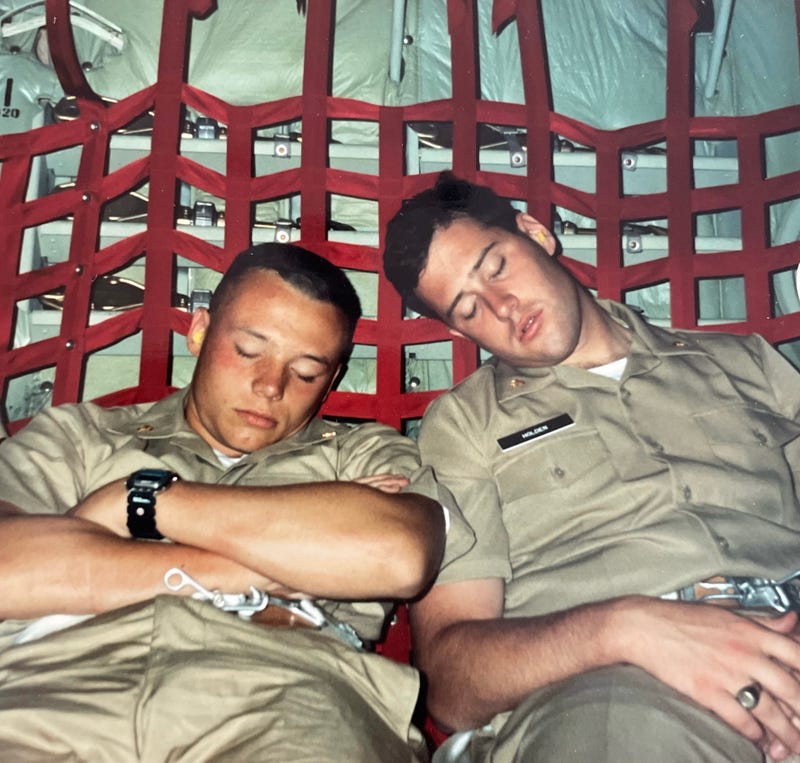
May is Military Appreciation month, and with that in mind Connecting Vets will be running a series of profiles on veterans that have transitioned into the civilian world. We'll discuss their military career, how they transitioned, and what advice they would give to other vets going through the same. Today, we speak with former Marine Corps officer and lawyer Robert Bracknell. In the featured image above you can see Robert with his son Jackson who commissioned into the Marines in 2023.
What propelled you towards military service? When did you join, which branch, which duty position(s)?
ROTC scholarship, plain and simple. No ROTC, I probably wouldn’t have served. Well, maybe, but it was decisive. My family was all Army. Like Lieutenant Dan. Great Grandfather Spanish American War. Grandfather (maternal) WWI (Silver Star) artilleryman. Grandfather (paternal) WWII North Africa and Italy artilleryman. Father, Vietnam era but served in South Korea (helicopter mechanic). Uncles and cousins, including 1 SF uncle (Vietnam) and 1 SF cousin (Desert Storm, OIF, etc.)
It was a family tradition, but not one of those that anyone specifically acknowledged as an expectation. There were no rooms dedicated in the house, no big I love me walls. Just a bunch of one-term soldiers and a couple of us long-termers. My first inclination would have been an Army ROTC scholarship but Army ROTC at Carolina was cross enrolled at Duke and I just wasn’t interested in driving constantly to Durham to participate. So I accepted the Navy ROTC scholarship and then opted into Marine Corps.
Tell us a bit about your military service, positions served, moving up through the ranks, deployments, memorable moments.
I was an armor officer out of TBS (armor training at Fort Knox), then after one tour I accepted the Corps’ invitation to become a lawyer. I did that and stayed 22 years in total. I was first a prosecutor and then an SJA almost exclusively the rest of my career. My final assignment was as a staff attorney at the Military commissions in Guantánamo Bay.
Becoming an armor officer was almost an accident. It was a very difficult MOS to get (2 slots in a TBS class of 250 as opposed to infantry which was probably 40+ and artillery which was probably 25+. It just happened. I recall there was one lieutenant in my platoon at TBS. He wanted to be a tanker so bad. He was a VMI grad so I don’t know why he didn’t just go in the Army, but whatever. He had all these armor tactics books in his barracks room – Liddell Hart, Guderian, Rommel, etc. He got infantry instead. He approached me after MOS selection – “HOW DARE YOU!!!!! YOU KNOW I WANTED TO BE A TANKER!!!” And I was like, hey, man, it’s cool, let’s trade, I’ll do infantry, I don’t really care that much (which infuriated him more) but they weren’t having the trade. So after about 3 years of being a tanker, which was great, I sort of realized the Abrams (70 tons, really thirsty, maintenance intensive, expensive to repair) and the Marine Corps (naval, light, expeditionary) were incompatible. 30 years later Tanks are gone from the Corps. Coincidence? I feel like I was prescient, but there was no way the Corps was going to divest of tanks during OIF/OEF.

It took real focus on the maritime mission to realize the Corps needed to divest of that capability to reinvest in other areas. So I applied to be a lawyer. I started as a prosecutor, mostly doing drug cases but some sex assault cases. Later, as an SJA, that weighting of the case load flipped big time. I deployed to Iraq twice (3d MAW and 5th Marine regiment) and Afghanistan once (ISAF/CSTC-A), plus Bosnia (SFOR) and I spent about a year cumulatively in Cuba (JTF 160 with a rifle platoon and as a J3 staff officer, and later as a lawyer at the Military Commissions).
When did you transition out of the military and why?
2014. My career in the Corps culminated and I was a geo bach in DC with my family in Virginia beach. I had been a geo bachelor for 4 of the previous 5 years, plus deployments and what not, and I was tired of that. So a job opened at NATO and I took it. It wasn’t exactly what I wanted or needed career wise, but it fit my family situation so I went over the side (Navy-speak for “I left the service”). Of course, my then-wife asked for a divorce in less than a year, so man did I wish I had THAT decision to do over again. But I ain’t complaining – along the way I got my BA at UNC, then a JD (government dime) from Maryland Law, a Master of Laws from Harvard Law, and I spent a year on a fellowship at the Atlantic Council. It was a pretty good run.
What did you transition to in the private sector (or continued governmental service) and what were the biggest challenges you faced in doing so?
Oh man. Do we get to curse at this point? SOOOOOOOO much to say.
Veterans hiring in US companies typically means almost only for labor positions. It has not been my experience companies are that eager to hire professionals into their ranks from the military. It happens, but most companies’ processes are not geared for that. When Home Depot says they’re a veteran friendly employer, they’re mostly talking about wearing an orange apron, not getting into the pathway to becoming the VP for HR or the CFO.

So, officers and senior NCOs, brace yourself for that.No matter what the retired Gunny in the JC Penney suit from the separation course tells you about “civilianizing” your resume, that only goes so far. You gotta meet them where they are. Like certifications based in ISOs. (see below). That’s kind of a big deal. Brace yourself for big family changes. When you retire, everything changes. I was in a tough spot mentally when I retired because I instantly knew the job I took for the sake of my family left me feeling terribly hollow. It wasn’t what I wanted for my own career at all, and I felt it 9/10 days at work. Did I learn in that job? Yes. But there was also zero opportunity for advancement, and I felt like I was carrying others’ load constantly with little appreciation. It simply wasn’t where I wanted to be and then I got trapped there. Maybe I brought that home? I know I felt unhappy and I was working hard not to bring that unhappiness home with me. I might have failed at that.
So you and your family will be in a new situation not really like anything you experienced before. Monitor your risk factors and seek help if the family starts to go off the rails, if you value keeping it on.
What is the biggest piece of advice you would give to a veteran currently transitioning from military service?
Start transitioning early. I don’t mean be retired on active duty, keep doing your job well, but use government resources to get certifications, qualifications, etc. to make yourself more attractive. If you’re in cyber, grab all the certs you can. If you fancy yourself a risk manager, get qualified as a CRM before you leave. If you’re in human resources, get CHRM before you leave. If you want to do supply chain, get the CSCP certification. Logistics? CPL. These are important because civilian employers know what they mean without translation.
Get over your vet-bro-ness quick. In the Marine Corps, there’s this weird myth that Marines are superior to their civilian counterparts in every way. Jesus H Christ, that’s garbage. Some are. The really high performers – in my field, the John Bakers, the Keith Parrellas, the Brian Palmers, the Ian Brasures, guys like that who could hold their own ANYWHERE but chose to keep wearing a funny looking tree suit. But let me tell you, I work in a law firm now and there are only two lawyers in the firm with any military service, and that was long long ago, so long ago they don’t identify with it at all. And the quality of the lawyers in this firm blows away 75% of the lawyers I served with on active duty. And the legal support personnel? They’re better than 90% of the Marines. These people work hard, efficiently, and they make money for themselves, the firm, and the staff.
Brace yourself for the hollowness that exists in your “new” friendships. I worked at NATO for almost 9 years. In an organization of 650 people there were 500 rotating military and 450 of them were not Americans. I didn’t expect lasting friendships with the uniforms because most of them were here on a 3 year travel program, an extended American vacation to see the Rock and Roll Hall of Fame, the Grand Canyon, the Mormon Tabernacle, Disneyworld, and the World’s Largest Ball of Twine. But I thought I had 10-15-20 real friends among the civilians, and I tried to stay in touch with them, but they absolutely GHOSTED me. Maybe it’s me, I don’t discount that. But I don’t think so.

I have a ton of friends I’ve had for between 10 and 40 years. I really think that because I wasn’t useful to them any more, because I was no longer working overtime to keep them out of trouble, or shouldering their load, they just didn’t need to make space for me any more. It was disappointing and honestly surprising. Maybe I’m just naïve in that I expected better. Most friendships outside the military are pretty transactional. The parents on your kids’ sports team? They will throw you under the bus to get their kid 30 more minutes of playing time. The people you are networking with? They are mostly trying to sell you something, and so are you. I’m not angry or disappointed in any of this – I’m just clear eyed about it now.
Be open to new opportunities. I got my job in the law firm off a cold call. They were intrigued, and took a leap of faith that I could do as much or more as I told them I could. I’m also continuing to be open to new things now, so Hey Google, Amazon, Raytheon, and Lockheed Martin, happy to send over my resume.
Finally, people are going to try to pigeonhole you as “the veteran.” Many of them are 5 movies deep on their knowledge of veterans. Don’t accidentally or purposefully reinforce their suspicions. If they expect you to be brash, surprise them with your respectfulness. If they expect you to be reactive, shock them with your contemplative thoughtfulness. If they think you’re vulgar, don’t curse at work.
